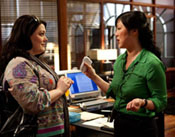"What would you do if you woke up tomorrow and you were beautiful?" That question was asked of comedy star and actress Margaret Cho when she was a guest on a radio show. The person posing the question was a male disc jockey. Totally taken aback by the effrontery of the query, Cho responded, "What do you mean?"
Her interviewer continued, "What if you woke up tomorrow and you were blonde, and you had blue eyes, and you were 5'11", and you weighed 100 pounds, and you were beautiful? What would you do?" Cho, with rapier wit replied, "I probably wouldn't get up because I'd be too weak to stand." (Note: The Metropolitan Life weight tables for women put a small framed woman of that height at the starting weight of 138; a large framed woman is within the healthy range at up to 170 pounds.)
Everyday young girls and women are being bombarded with images that set the standards for what constitutes visual attractiveness in our culture. Cho knows about these strictures first hand, and addresses them in her stand-up comedy special on Showtime entitled "Beautiful." Filmed nine days before the presidential election, Cho's act is political, provocative, and at times raunchy. Taking on issues of race, sexuality, and identity, Cho -- in her fifth stand-up comedy film -- recounts her experience and reaction to the radio personality who felt that she was missing the "beauty boat."
"I felt sorry for him," Cho tells the audience, "because if that's the only kind of person you think is beautiful, you must not see very much beauty at all in the world." Using a deadpan delivery she told the crowd, "I'm into complimenting myself, and I think you should do the same." Rhetorically asking, "What is beautiful?" she informed her listeners, "I'm coming out of the beautiful closet."
With Proposition 8 on California's ballot just over a week away from the date of her performance, she stated, "I think it's very political to feel beautiful, especially if you're queer. Because you have to take on the world every day of your life to survive."
Cho speaks from first hand experience about the perils of what can happen when you try to conform to an ideal that doesn't speak to your personal truth. In 1994, she was tapped to star in the first "Asian-American" sitcom on broadcast television. The show, All American Girl went through several phases as the creators debated if Cho was "too Asian or not sufficiently Asian." The final product got watered down, as network executives feared that the content was "too ethnic." That wasn't their only concern. They criticized Cho's physical appearance and her face structure (too round). As a result, she starved herself for weeks to achieve a weight loss that would be commensurate with their expectations. The goal was to have the right look in time to shoot the pilot episode. As Cho told me when we spoke by telephone, the result was not just a thinner Margaret Cho. Due to the crash diet she had undertaken, she developed kidney failure. The irony was that in order to play the role of herself, Cho had to morph into a different individual.
All American Girl was replaced in the line-up with The Drew Carey Show. Cho pointed out that a double standard was at play. Why wasn't Carey, also a comedian, judged by his looks?
Cho qualified "eating disorders as a terminal disease." "Women don't live their lives fully because they are always concerned about if they are thin enough to be attractive, instead of accepting their weight." For her, the struggle began at an early age; she had been dieting since the age of five. "I got it from my Mother," she said, referencing the stereotypical Asian female body type as "birdlike." Growing up, she felt out of place. When Hollywood came calling, it reactivated all of her childhood fears and insecurities. Not eating for a month to prepare herself for the debut episode of her show, Cho created health complications that still linger. Looking back, she depicts the experience as "very hard," but something that she learned from. "I didn't have to participate," she stated, "but I survived."
Cho is currently a member of the cast of Lifetime's new series "Drop Dead Diva," which premiered on July 12. The story line follows a shallow wanna-be model, who unexpectedly dies in a car crash and comes back to life in the body of a "plus-size brilliant attorney." Cho is on hand as her assistant, helping her to navigate the ramifications of her new physical presence. Lifetime is partnering with two non-profit organizations to drive a conversation about "being healthy at every size." Working with Jess Weiner, self-esteem and body image expert, mylifetime.com is featuring "toolkits" to help audiences explore the topics presented in each episode.
Fifteen years after All American Girl, women are still struggling to break free from the parameters of "conventional beauty." With Margaret Cho telling it like it is, the fight might become a little easier.

Photo: Bob Mahoney/Lifetime
This article originally appeared on Empowher